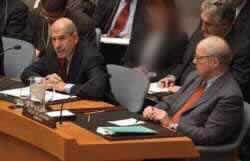HIGHLIGHTS|| Top UN Inspectors Say, 'A Change in Iraq's Attitude Key to Peace'|| UN Security Council to Quiz Blix & ElBaradei on Wednesday|| Inspectors Almost Certain Iraq Now Has No Nuclear Warfare Program; But Doubts Remain About its Biochemical Warfare Capabilities|| STORYThe top U.N. inspectors urged Iraq on Tuesday to produce fresh evidence about its weapons programs and cooperate fully, warning that time is running out and this was probably the last chance to avoid war.
A day after reporting to the Security Council on the resumption of inspections two months ago, Hans Blix and Mohamed ElBaradei said a change in Iraq's attitude toward disarmament and inspections is the key to peace.
"The ball is entirely in Iraq's court," ElBaradei, head of the International Atomic Energy Agency, told CNN. "Iraq now has to prove that it is innocent. ... They need to go out of their way to prove through whatever possible means that they have no weapons of mass destruction."
Blix told The Associated Press he would have asked for more time for inspections "if I were confident and sure that we would find answers in some months time - but I think that it still calls for a changed attitude on the part of the Iraqis, and I'm therefore not asking for it."
Nonetheless, he said, "I would certainly welcome and accept that we continue the work that (the inspectors) have started. We just got up to speed."
The two inspectors issued vastly different assessments on Iraq's cooperation, and council members weighing the possibility of another Iraq war will get another chance to quiz them about their reports Wednesday.
The 15 members have had time to check with their capitals, and diplomats said the closed meeting should provide the first indication on where the 15 governments stand. This is critical for the United States if it wants U.N. authorization for any military action because it needs a minimum of nine "yes" votes and no veto by a permanent member.
The five permanent members remain divided on how much time Iraq should be given to comply.
Blix listed more than a dozen key questions that Iraq has failed to answer and suggested Baghdad was lying about its biological and chemical weapons.
But ElBaradei was more upbeat, saying there was no evidence Saddam Hussein was restarting his nuclear program and he could finish his work in a few months. His spokeswoman, Melissa Fleming said "three or four months would be realistic provided we get proactive cooperation from the Iraqis."
Blix, who is in charge of chemical, biological and missile inspections, attributed the different assessments to the jobs that he and ElBaradei have. ElBaradei is responsible for nuclear disarmament where there are no real questions any longer.
ElBaradei said in an interview Tuesday with al-Jazeera that he told the Iraqis during a Jan. 19-20 visit that it wasn't enough just to make progress on nuclear issues, it must be made on the biological and chemical programs as well.
ElBaradei said he and Blix discussed Iraq's disarmament Monday night.
"We agreed that we need to make one further effort and I hope we succeed," he told CNN.
The Iraqis indicated they got the message, though they insisted that they have fully cooperated with inspectors.
PHOTO CAPTION
Mohamed ElBaradei, left, executive director of the International Atomic Energy Agency, addresses the United Nations Security Council as chief U.N. weapons inspector Hans Blix, right, looks on at U.N. headquarters Monday, Jan. 27, 2003. (AP Photo/Ric
- Author:
& News Agencies - Section:
WORLD HEADLINES


 Home
Home Discover Islam
Discover Islam Quran Recitations
Quran Recitations Lectures
Lectures
 Fatwa
Fatwa Articles
Articles Fiqh
Fiqh E-Books
E-Books Boys & Girls
Boys & Girls  Hajj Rulings
Hajj Rulings Hajj Fatwas
Hajj Fatwas














